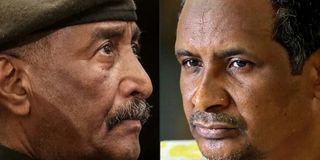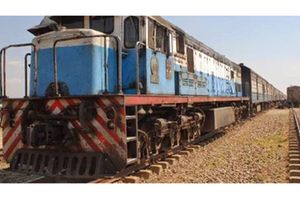Prime
Why Sudan's poison is others' meat

Sudan's Army chief Abdel Fattah al-Burhan (left) and paramilitary Rapid Support Forces commander, General Mohamed Hamdan Daglo (left).
PHOTO | COURTESY
What you need to know:
- Meanwhile, if we can give sentimentality and morality a short break, Sudan’s continued pain has been a gain for others in the region. True, the war has hit Uganda’s pockets hard. Uganda is Africa’s largest exporter of coffee and, after Italy, Sudan was the second-largest importer of its beans. The war has rained on that.
On Monday, Sudan’s government, led by Army Chief Abdel Fattah al-Burhan, refused to join a regional meeting in the Ethiopian capital Addis Ababa, aimed at ending three months of brutal fighting, accusing Kenya of favouring rival forces.
A tussle for power between al-Burhan and his former deputy Mohamed Hamdan Daglo, popularly known as Hemedti, commander of the rebellious paramilitary Rapid Support Forces (RSF), turned into war mid-April and has since killed around 3,000 people and displaced millions.
Neither warrior personally attended the East African and Horn of Africa bloc InterGovernmental Authority on Development (Igad) meeting, chaired by Kenya, but the RSF sent a representative.
Al-Burhan might soon learn that giving the Igad meeting a wide berth was a mistake. It often makes more sense for those who don’t want peace than those who do attend mediation. You score cheap political points and get to eat your cake. You might be accused of being unreasonable and inflexible but nobody would say you are fundamentally anti-peace. The fellows who want peace often lose more because they are more accommodating and tend to give up more ground to achieve peace.
A recent example is the Tigray peace talks that former Kenyan President Uhuru Kenyatta brokered. In alliance with Tigray, Ethiopian Prime Minister Abiy Ahmed had pummelled a once-nearly-triumphant regional force into submission with a horrific food shortage threatening to extinguish its people. Tigray would have been consigned to the Stone Age, so it cut its losses.
Abiy didn’t have to show up; he had achieved a victory on the battlefield. But he did, allowing him to look like a magnanimous victor. Conversely, Tigray emerged looking defeated, leaving several of its supporters angry that their sacrifice had been in vain.
Geopolitics works
Meanwhile, if we can give sentimentality and morality a short break, Sudan’s continued pain has been a gain for others in the region. True, the war has hit Uganda’s pockets hard. Uganda is Africa’s largest exporter of coffee and, after Italy, Sudan was the second-largest importer of its beans. The war has rained on that.
But it has also scored. Its military ally, South Sudan, has done well in the war in Sudan. Since its renewed fighting in 2013, South Sudan has been seen as a basket case. But the lord of geopolitics works in mysterious ways. While Khartoum scorns Kenya, South Sudan has been one of the crucial mediators in the Sudan war, brokering ceasefires. Juba as a peacemaker in the war changes the political narrative and perceptions in a big way. Suddenly, it is no longer as bad as Sudan by comparison.
Uganda and Kenya, the two key regional players in South Sudan’s war of liberation, and the long-drawn out peace talks that eventually led to its independence, respectively, are now cashing in on that investment. If there had been no South Sudan, the war between Burhan and Hemedti would be at the border of both countries.
It would have been a bigger spot of bother for Kenya because it would have three strife-torn (or recently war-wracked) countries—Ethiopia, Sudan and Somalia—on its northern border.
Ethiopia, too, is profiting. Egypt and Sudan had opposed the mega Grand Ethiopian Renaissance Dam (Gerd) on the Nile as threatening their very existence, allegedly because it would interfere with the flow of the water. Without the Nile, there would be no Egypt as we know it. Therefore, it was more outspoken in its opposition than Khartoum, which would still get by.
Hardliners in Cairo have threatened to bomb the Gerd. At the height of the Tigray war, when the rebels seemed to have Addis on the run, elements in the Abiy government accused Egypt and Sudan of using them as proxies in the fight over the Nile.
There are probably nationalists in Addis who see the war in Sudan as karma as it has scuttled the two countries’ campaign against the Gerd. Egypt is backing Burhan. One shouldn’t be surprised to find people in the Ethiopian government who see the RSF as a diplomatic lottery.
Stable nation
In Asmara, the tall Eritrean President Isaias Afwerki stands taller. The Tigray war allowed him to exact revenge for the 1998-2000 Ethiopian-Eritrean war, which was very costly. Asmara viewed the war as a project of the Tigrayan elite and then-Ethiopian rulers.
Saving Addis Ababa’s skin further elevated Afwerki’s credentials and prestige in a region led by tough men. Sudan’s war has left Asmara as the principal stable nation in the Horn (Djibouti is smaller in population and a military minion).
When Afwerki went to Moscow to talk to “comrade” Vladimir Putin about the Ukraine war, the Russian leader took him far more seriously than the group of African chiefs led by South African President Cyril Ramaphosa, whom he belittled. Eritrea is very confident; it has just rejoined Igad, having walked out 16 years ago.
When the fighting in Sudan ends, the new sheriff of the Horn will sit in Asmara.
Mr Onyango-Obbo is a journalist, writer and curator of the “Wall of Great Africans”. @cobbo3



